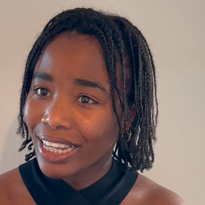Marella

Marella (played by an actor) formula fed her eldest child but is planning to breastfeed her second baby. She read research papers, attended conferences and spoke to her doctors, her husband and her mother to help her make this decision.
Marella is Black British African and works as a Dramatherapist. She is married, has a two-year-old child, and is currently pregnant. She was born with HIV.
More about me...
Marella was born with HIV and started taking medication during adolescence. She is well-informed about HIV, and from a young age she knew that she would be able to have children born without the virus. Marella is married and her husband (Edward) does not have HIV. They have been together for a few years. She was pregnant with their older child when the UK infant feeding guidelines changed to state that although formula feeding was still encouraged, mothers with HIV wanting to breastfeed could be supported to do so if they had an undetectable viral load. Despite meeting the criteria, Marella and Edward decided to formula feed their eldest child because it was their first baby and at that time, they did not feel they had sufficient understanding of the risks involved.
At the time of interview, Marella was pregnant with her second baby, and this time she was planning to breastfeed. She works within HIV care and advocacy, and in the previous two years she had done a lot of her own research about HIV transmission via breastmilk. She also found two lactation specialists, including one who specialised in HIV and breastfeeding (privately funded). With all this in place, Marella and Edward felt more confident about choosing to breastfeed this time. Marella wanted to experience breastfeeding for the associated health benefits and bonding with her baby. She clarified that her desire to breastfeed was not due to hiding her status, as all her loved ones know that she and her mother are living with HIV.
Update: After she gave birth, Marella sent us an update about how she found the experience of breastfeeding. She said that it was wonderful, and that this aspect is not talked about enough by medical staff, who often focus solely on HIV transmission risk. Marella also described receiving mixed support from her medical staff: while her HIV consultant and midwife were supportive of her plans to breastfeed, her paediatrician had warned her not to be “stubborn” if breastfeeding did not work. Because of the inconsistent support, Marella contacted an HIV physician involved with the UK pregnancy and infant feeding guidelines (whom she knows through her advocacy work) for additional guidance and support. Marella is happy with her decision to breastfeed.
Marella and her husband Edward looked for a lactation specialist while she was still pregnant (played by an actor).
Marella and her husband Edward looked for a lactation specialist while she was still pregnant (played by an actor).
I’d mentioned it to my husband and he said that it was a good idea was to have a private lactation consultant, so I think when you give birth, you have access to like a feeding team. But again, that’s sort of like you’d go to like sort of health visiting clinic and they would support you. But I think we’re very fortunate. Obviously, we can afford to have like additional support. So, paying someone privately that can come on day two to make sure that I’m doing it right and we don’t have to rely on having to book an appointment and perhaps that appointment being like in a week’s time. Because I know that the window of it going wrong or like if I do get an infection there’s a smaller window that we can correct it.
Marella had reviewed the same BHIVA guidelines, in 2018, when she was pregnant with her 2-year old but had decided against breastfeeding. She feels differently now.
Marella had reviewed the same BHIVA guidelines, in 2018, when she was pregnant with her 2-year old but had decided against breastfeeding. She feels differently now.
I think I remember my doctor sort of asking if I’d thought about it. And I was very much like no, not doing it, no way. I think I was, I was probably more headstrong and I just wasn’t, I wasn’t even considering it because, for me, at that time, the thought and the risk of transmission like outweighed any sort of desire I had and I was already like, you know, paranoid first mum and I didn’t really know what I was doing. Didn’t know how this would be and I was quite like okay with that decision.
Now obviously I’m pregnant again and I think guidelines, how I previously read the guidelines as to when I read them now, I didn’t—I think I am probably reading the same guidelines and there’s more behind it. My opinion has changed now. Whereas obviously before I was dead like certain that I would not now I’m actually considering it like quite shocking my change in mind-set considering it for this baby that I’m pregnant with. So and that’s been a two year yeah, two year gap.


